Letter Of Intent For Business Proposal
[Your Name]
[Your Address]
[City, State, ZIP Code]
[Email Address]
[Phone Number]
[Date]
[Recipient's Name]
[Recipient's Title]
[Company Name]
[Company Address]
[City, State, ZIP Code]
Subject: Letter of Intent for Business Proposal
Dear [Recipient's Name],
I hope this letter finds you in good health and high spirits. I am writing to express my sincere interest in exploring a potential business partnership with [Company Name]. After carefully researching your company's achievements and values, I am confident that our collaboration could yield mutually beneficial results.
The primary objective of this letter is to outline our intent to engage in discussions regarding a business proposal. Our proposed venture would leverage the strengths of both our organizations to create innovative solutions and tap into new market opportunities.
Key Points of Interest:
1. **Nature of Collaboration**: Our vision for collaboration encompasses [brief description of the project or proposal]. We believe that by combining our respective expertise and resources, we can create a compelling value proposition for our target audience.
2. **Alignment of Values**: We have noticed that our companies share similar core values, including [mention shared values such as innovation, customer-centric approach, quality, etc.]. This alignment forms a solid foundation for a productive partnership.
3. **Mutual Benefits**: The proposed partnership would bring about various advantages, such as [outline the potential benefits, such as increased market reach, enhanced product offerings, improved operational efficiency, etc.].
4. **Commitment to Excellence**: Both our organizations are committed to maintaining the highest standards of excellence. We anticipate that our combined efforts will result in superior products/services that exceed customer expectations.
5. **Next Steps**: We propose that our respective teams schedule a meeting to discuss the finer details of this potential collaboration. This meeting could take place either in person or virtually, based on your preference.
We are excited about the possibility of working together and believe that our collective efforts can lead to remarkable achievements. Please consider this letter as a formal expression of our intent to move forward with discussions. We look forward to the opportunity to meet with you and your team at your earliest convenience.
Thank you for considering our proposal. Should you require any further information or have any questions, please do not hesitate to contact me at [your phone number] or [your email address].
Sincerely,
[Your Full Name]
[Your Title]
[Your Company Name]
[Your Company Address]
[City, State, ZIP Code]
[Email Address]
[Phone Number]
Formal Letter of Intent for Business Proposal
Subject: Letter of Intent for Business Proposal
Dear [Recipient Name],
We are writing to express our intent to enter into a business relationship with [Recipient Company]. Our company, [Your Company], is interested in proposing [brief description of the proposal, e.g., joint venture, partnership, service provision] to mutually benefit both parties.
We intend to discuss the terms, scope, and potential collaboration strategies at a mutually convenient time. This letter is non-binding and intended solely to outline our interest in exploring this opportunity.
We look forward to your response and hope to initiate discussions soon.
Sincerely,
[Your Name]
[Position]
[Company Name]
Casual Letter of Intent Email for Collaboration
Subject: Exploring Business Collaboration
Hi [Recipient Name],
I hope this message finds you well. I wanted to reach out to express our interest in exploring a business opportunity with [Recipient Company]. We are considering [describe proposal briefly] and believe it could be mutually beneficial.
Would you be open to a meeting or call to discuss this in more detail? This email is simply to express our intent and start the conversation.
Looking forward to your thoughts.
Best regards,
[Your Name]
[Company Name]
Provisional Letter of Intent for Business Negotiation
Subject: Provisional Letter of Intent
Dear [Recipient Name],
This letter serves as a provisional expression of interest in establishing a business arrangement with [Recipient Company]. We are currently reviewing potential collaboration opportunities related to [brief description].
Please note this letter is preliminary and non-binding. We would like to schedule a discussion to outline possible terms and objectives before moving forward.
Thank you for considering this opportunity.
Sincerely,
[Your Name]
[Position]
[Company Name]
Heartfelt Letter of Intent for Strategic Partnership
Subject: Expression of Intent for Strategic Partnership
Dear [Recipient Name],
We are excited to express our sincere intent to explore a strategic partnership with [Recipient Company]. Our team believes that combining our strengths in [area of expertise] with your capabilities could create significant value for both organizations.
This letter is intended to initiate dialogue and outline our interest. We hope to arrange a meeting soon to discuss objectives, expectations, and potential next steps.
Looking forward to a promising collaboration.
Warm regards,
[Your Name]
[Position]
[Company Name]
Quick and Simple Letter of Intent Email
Subject: Letter of Intent
Hi [Recipient Name],
We wish to express our interest in collaborating with [Recipient Company] on [brief proposal]. This email is to formally state our intent to explore the opportunity and discuss possible arrangements.
Please let us know a convenient time for a meeting or call.
Best,
[Your Name]
[Company Name]
Formal Letter of Intent with Detailed Proposal
Subject: Letter of Intent for Business Proposal
Dear [Recipient Name],
We are pleased to submit this letter of intent to propose a business collaboration between [Your Company] and [Recipient Company]. Our proposed plan includes:
- Scope of collaboration: [Brief description]
- Objectives: [List objectives]
- Expected benefits: [List expected benefits]
This letter serves to outline our interest and initiate formal discussions. It is non-binding and intended to facilitate negotiations.
We look forward to arranging a meeting to discuss details and explore mutual opportunities.
Sincerely,
[Your Name]
[Position]
[Company Name]
Informal Letter of Intent for Small Business Collaboration
Subject: Intent to Collaborate
Hi [Recipient Name],
I’m writing to express our interest in collaborating with [Recipient Company] on [specific project or service]. We see great potential in working together and would like to explore possibilities.
Let’s set up a time to chat and discuss how we can make this happen. This is just to formally express our intent and start the conversation.
Cheers,
[Your Name]
[Company Name]
Non-Binding Letter of Intent for Business Proposal
Subject: Non-Binding Letter of Intent
Dear [Recipient Name],
This letter confirms our non-binding intent to enter into discussions regarding a potential business arrangement between [Your Company] and [Recipient Company]. We are exploring the opportunity of [brief description].
Please note that this letter does not constitute a formal contract but serves as a preliminary expression of interest. We hope to schedule a meeting to outline terms and assess compatibility.
Thank you for your consideration.
Sincerely,
[Your Name]
[Position]
[Company Name]
What is a Letter of Intent for a Business Proposal and Why It Is Used
- A formal document expressing interest in entering into a business agreement or collaboration.
- Purpose:
- Signals intent to negotiate without binding commitment.
- Opens dialogue for proposal discussions.
- Provides a written record of interest for internal and external stakeholders.
Who Should Send a Letter of Intent for a Business Proposal
- Authorized representatives of the company expressing interest:
- CEO or Managing Director
- Business Development Manager
- Sales or Partnership Lead
- Must have the authority to negotiate and represent the organization.
Whom Should a Letter of Intent Be Addressed To
- Primary decision-maker in the target company (CEO, Director, or Business Development Lead).
- Legal or partnerships department if applicable.
- Anyone authorized to evaluate proposals and enter agreements.
When to Send a Letter of Intent for a Business Proposal
- Prior to formal contract negotiations.
- When seeking to initiate discussions about collaboration or partnership.
- As a response to an RFP or business opportunity.
- When signaling preliminary interest in a merger, joint venture, or service agreement.
How to Write and Send a Letter of Intent for a Business Proposal
- Start with a clear subject line indicating intent.
- Address the recipient appropriately.
- Introduce your company and express interest in collaboration.
- Provide a brief description of the proposal.
- Clarify that the letter is non-binding unless otherwise stated.
- Outline expected benefits or objectives.
- Invite further discussion or meetings.
- Send via formal email or printed letter depending on professional context.
Requirements and Prerequisites Before Sending
- Understand the proposal details and objectives.
- Review internal approval processes for sending formal letters.
- Gather supporting information (business plan, financial projections, scope of work).
- Ensure clarity on non-binding or binding intent.
Formatting Guidelines for Letters of Intent
- Length: 1 page preferred, max 2 pages.
- Tone: Professional, concise, and clear; adjust based on audience.
- Include:
- Subject line
- Greeting
- Expression of intent and overview of proposal
- Non-binding statement (if applicable)
- Invitation for discussion
- Closing statement and signature
- Avoid overly detailed financial or legal terms unless required.
Tricks and Tips for Writing an Effective Letter of Intent
- Keep language professional but approachable.
- Highlight mutual benefits to the recipient.
- Clarify non-binding nature if applicable.
- Provide contact information for follow-up.
- Maintain a copy for internal records.
Common Mistakes to Avoid
- Being too vague or ambiguous about the proposal.
- Including confidential information without an NDA.
- Using overly technical language that may confuse the recipient.
- Making binding commitments unintentionally.
- Forgetting to specify next steps or request a meeting.
After Sending a Letter of Intent
- Confirm receipt with the recipient.
- Prepare for follow-up meetings or calls.
- Keep internal stakeholders informed of responses.
- Document any feedback or changes discussed in subsequent conversations.
Pros and Cons of Sending a Letter of Intent
Pros:
- Opens formal communication channels.
- Demonstrates professionalism and seriousness.
- Helps align expectations before negotiations.
Cons:
- Could be misinterpreted as binding if unclear.
- Requires internal approvals before sending.
- Early disclosure of proposal details may reveal strategic intent.
Elements and Structure of a Letter of Intent for Business Proposal
- Subject line clearly indicating purpose.
- Formal greeting.
- Statement of intent and introduction of your company.
- Brief description of the business proposal.
- Non-binding statement (if applicable).
- Expected benefits and objectives.
- Call to action or request for meeting.
- Closing statement and signature.
- Optional: attachments or supporting documents.
Does a Letter of Intent Require Authorization?
- Yes, must be authorized by relevant senior management.
- Legal review may be required if terms or commitments are included.
- Signature by an authorized representative ensures credibility and enforceability.
How Many Letters of Intent Should Be Sent
- Typically, one letter per potential partner or opportunity.
- Multiple letters may be required if engaging several prospects simultaneously.
- Ensure each letter is tailored to the recipient to maximize impact.
Compare and Contrast Letters of Intent with Other Business Communications
- Letter of Intent vs Proposal: LOI expresses interest; proposal details execution plans.
- LOI vs Memorandum of Understanding: LOI is often non-binding; MOU may outline terms more formally.
- Email vs Printed LOI: Email is faster but must maintain formality; printed LOI is more traditional for serious negotiations.
FAQ About Letters of Intent for Business Proposals
-
Q: Is a letter of intent legally binding?
A: Generally non-binding unless specified. -
Q: Should financial details be included?
A: Only high-level figures; avoid full disclosure without NDA. -
Q: Can a LOI be sent as an email?
A: Yes, if it maintains professional format and clarity. -
Q: What if the recipient does not respond?
A: Follow up politely, or reassess engagement strategy. -
Q: Can multiple recipients receive the same LOI?
A: Each letter should be customized for the recipient.

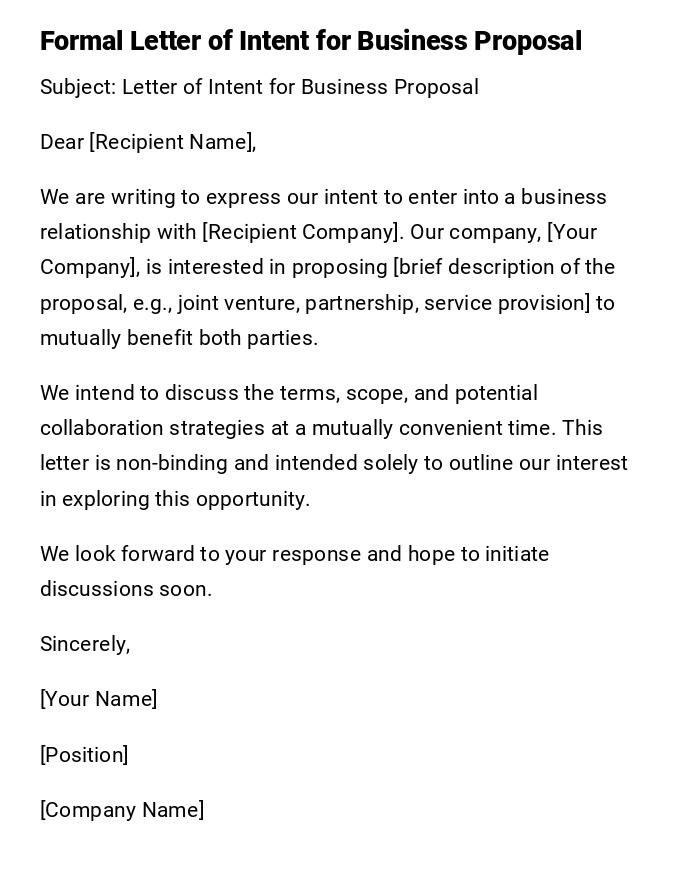
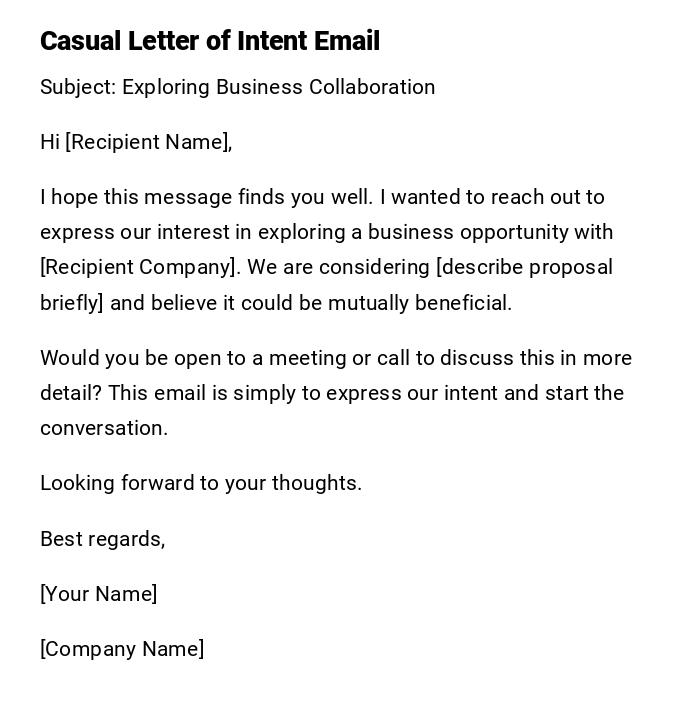
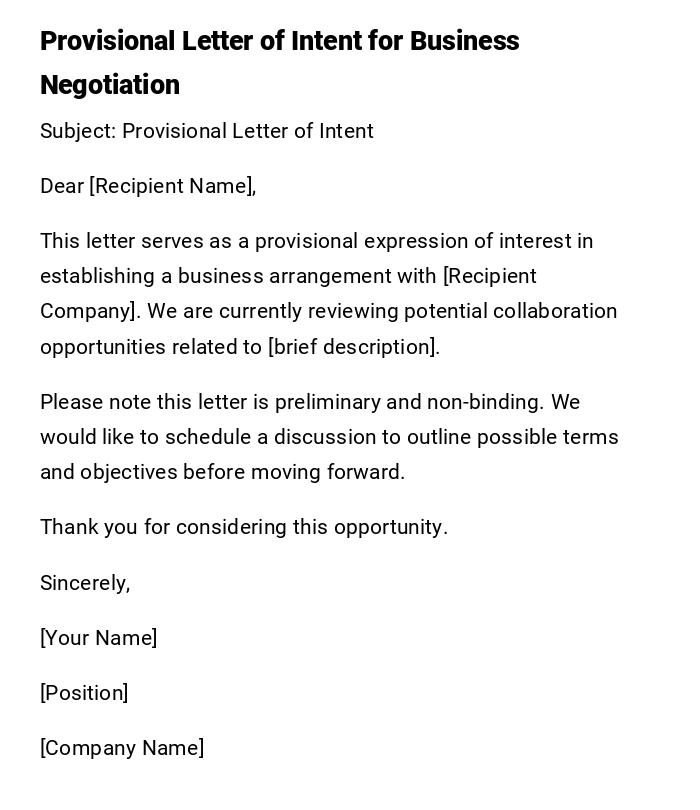
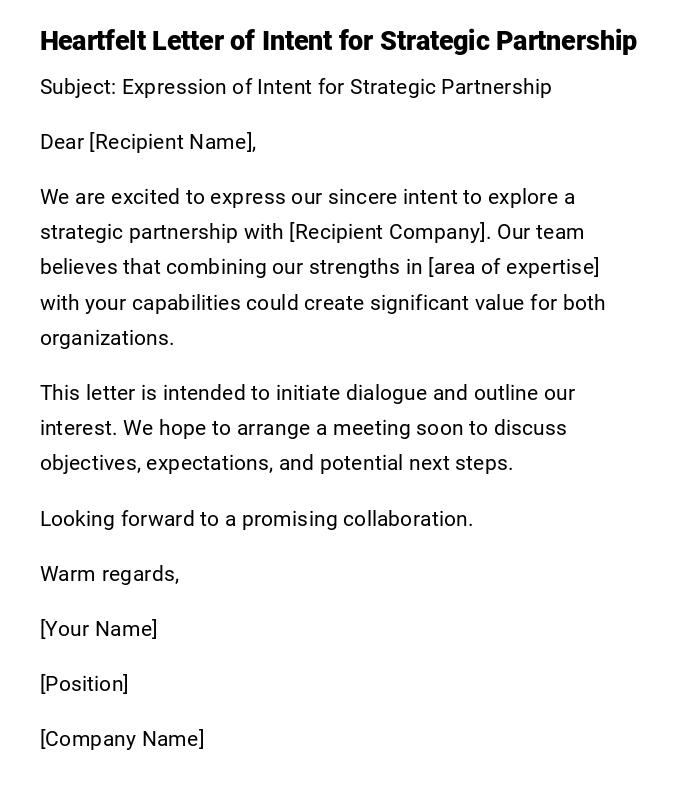
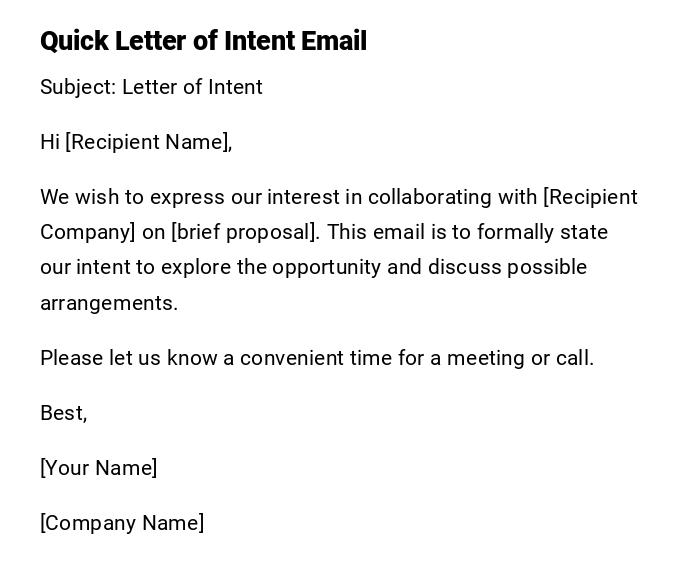
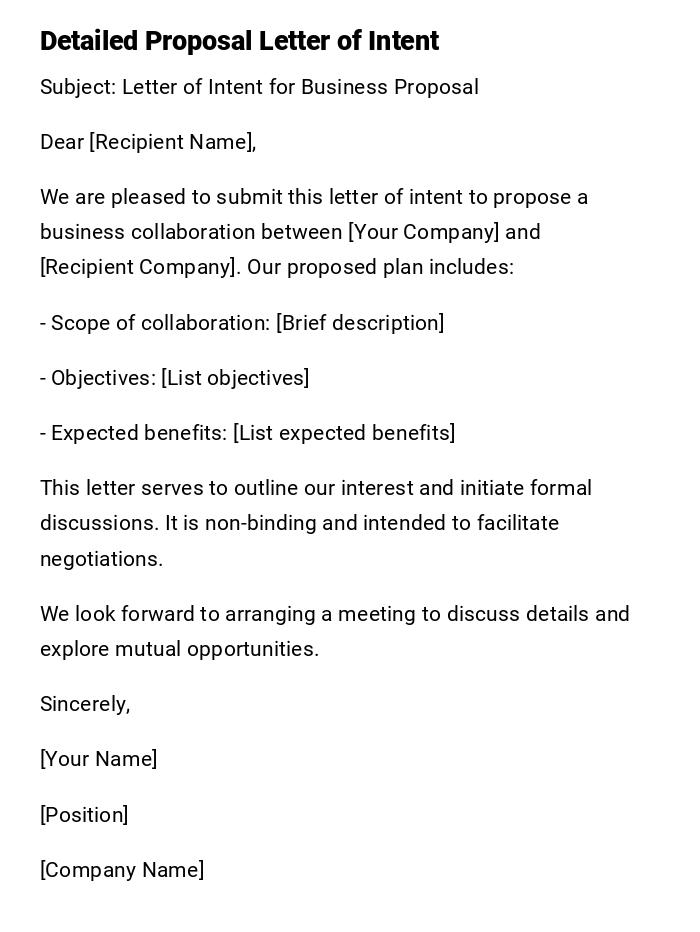
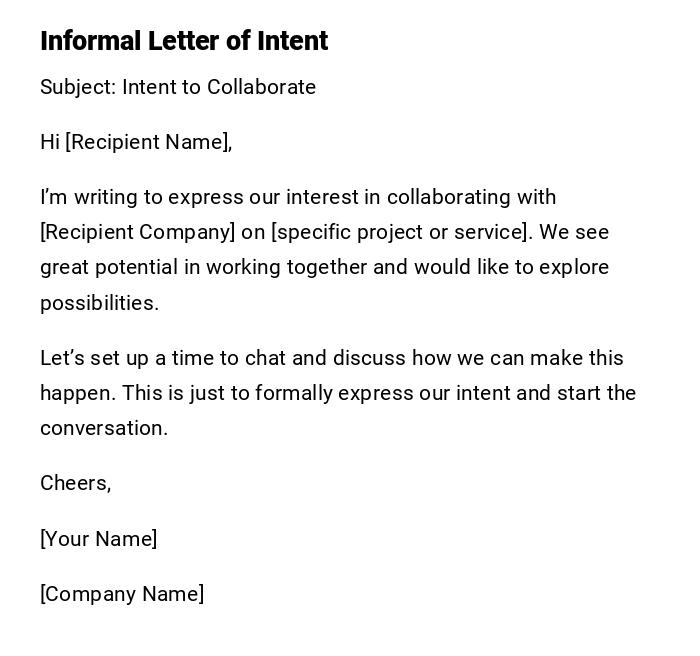
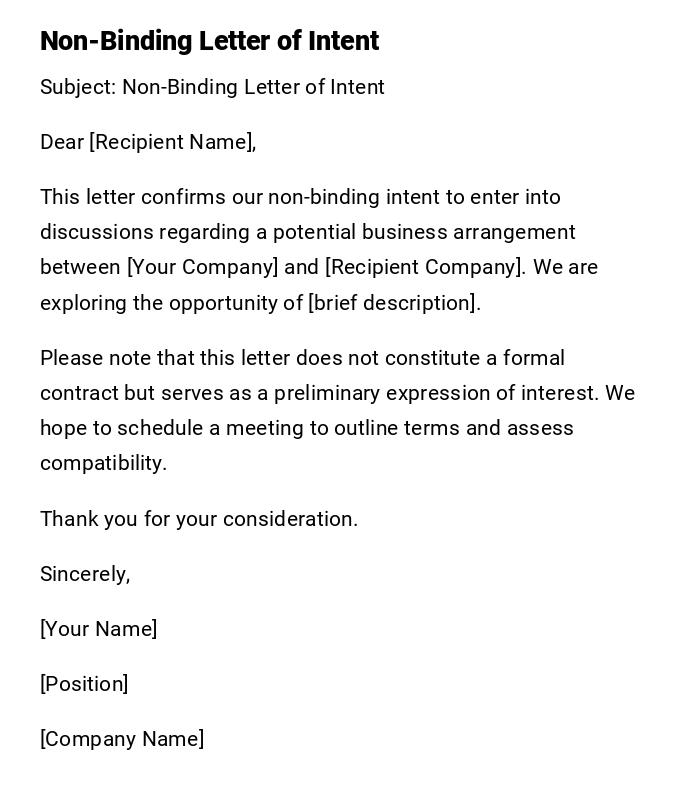

 Download Word Doc
Download Word Doc
 Download PDF
Download PDF